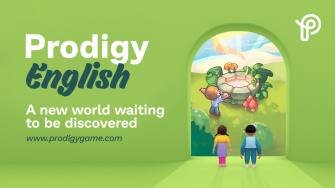Fun can be a very powerful motivational tool in the classroom. Digital game-based learning (DGBL) has steadily grown in popularity as teachers work tirelessly to engage students to improve learning outcomes. Student engagement is reason enough to employ DGBL, but it also brings other benefits such as social-emotional learning (SEL) competencies , including motivation, confidence, and self-efficacy.
There are digital game-based learning tools that support the integration of SEL into the classroom. One such company that’s established itself as a leader in DGBL is Prodigy Education. Prodigy is best known for its hugely popular math game, but recently they announced a major expansion to their game portfolio with the release of Prodigy English, a completely new game which allows students to build their own online world while learning curriculum-aligned English skills.
Prodigy is especially interesting because of its focus on SEL indicators, like confidence and motivation. Its core philosophy to its educational games is Motivation First!. Prodigy believes that maximizing student motivation levels helps develop a love of learning that will last a lifetime. To drive this, Prodigy employs an adaptive algorithm to automatically detect students’ strengths, find their areas of need and keep them in their zone of proximal development. Students see content which is challenging enough to keep them engaged and motivated, but intuitive enough to take them to various prerequisite skills when it detects struggle.
This means Prodigy’s adaptive algorithm ensures that learning is student-centered. It provides students with personalized learning that is continuously updated as they progress through the games. In a 2021 survey by Prodigy Education with over 1,000 parent responses, nearly 7 out of 10 reported that their child’s confidence had improved after using Prodigy Math. Though confidence too often is considered simply a soft skill, it is an important connection to a student’s academic achievement, and perhaps most importantly, social-emotional skills. Additionally, in a 2021 survey with more than 2,200 parent and teacher responses, 96% surveyed said they were satisfied with the educational impact of Prodigy Math.

The Collaborative for Academic, Social, and Emotional Learning (CASEL) is one of the leading organizations in research and implementation of SEL in schools. In the SEL competency framework developed by CASEL, two core competencies, self-management and self-awareness, are highlighted as necessary components of a student’s SEL toolkit. Self-management is the ability to “manage one’s emotions, thoughts, and behaviors effectively in different situations to achieve goals and aspirations” and includes indicators such as exhibiting self-motivation. Self-awareness is defined as the ability to “understand one’s own emotions, thoughts, and values and how they influence behavior across contexts” with indicators such as identifying one’s own emotion (such as confidence) and self-efficacy. Self-efficacy is the level of confidence one believes they have in how their behavior impacts their performance. A study led by Dr. Robyn Pierce (2004, p. 290) defined mathematics confidence as “a student’s perception of their ability to attain good results and their assurance that they can handle difficulties in mathematics,” which is, essentially, self-efficacy in math.
In understanding the CASEL competencies, it’s easy to see where digital game-based learning could be linked to a platform like Prodigy, which puts these at the forefront. As students play the curriculum-aligned Prodigy Math and English games, they are motivated by the engaging video game-like ecosystems and building their confidence through finding success as they learn. As this occurs, they build self-efficacy, and this belief shows up in the classroom when they are faced with math challenges in more traditional instruction and collaborating with their peers. The more the students play, the more confident they could become and the more motivated they could be to continue learning. This is a beneficial cycle for students, parents, and teachers.

Furthermore, through its freemium business model, educators can use Prodigy Math and Prodigy English completely free of charge in the classroom - an enormous benefit with teaching budgets already stretched. This free access is made possible through optional memberships that parents can purchase for their children to help track their progress and access additional gameplay features, which can boost student engagement and motivation. Educators can monitor students’ learning progress and leverage the Prodigy Teacher Portal, inside and outside the classroom. This interface provides insights into student usage, performance, trouble spots, and an overview for assessments and Placement Test progress. We have a significant opportunity in the growth of digital game-based learning to better understand and incorporate the social-emotional needs of students. These tools equip educators with critical tools to provide more targeted support for their students. This is why Prodigy developed a model to provide in-game educational content free of charge, with optional membership for parents. At a time when student literacy levels are a national concern, Prodigy Math and Prodigy English helps every student love learning, an incredible win for teachers, parents, and students alike.
Click here to learn more about using Prodigy in the classroom.